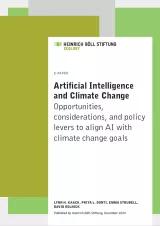Something sounds awry about the term ‘twin transition’. The concept, often used in EU or UN contexts, ties two crucial transitions: the move to renewable energy and the digitalisation of economies. While it sounds forward thinking, evidence suggests this pairing may be less beneficial than promised. As developing countries bear the socio-environmental costs while reaping limited benefits, a handful of tech giants continue to dominate global markets. Paz Peña raises a crucial question: is this ‘transition’ truly a path to equity, or does it deepen old divides under the guise of green progress?

What is behind the concept of the twin transition? Is it a technical term that, with evidence, demonstrates its necessity and urgency, or is it a political framework that aligns geopolitical interests so that colonial “green” capitalism is not threatened by changing its fuel sources? In a political world dominated by the interests of the fossil fuel industry, and capitalism itself, as usual, which is downright criminal in failing to take decisive and urgent action to prevent global warming from reaching 1.8°C, ordinary people can afford to be sceptical when we hear bombastic terms like the twin transition.
This concept shows that two major ongoing societal transitions are currently separate but equally important, and should go together, like twins. These are the energy transition (which is scientifically urgent because the planet needs that we ensure the energy for our economic activities comes from renewable sources) and the digital transition (which is being accelerated by the digitalisation – or rather platformisation? – of all aspects of life). The twin transition is about how the dynamics and strength of society’s digital transition affect the green transition, and how these transitions influence each other and must be combined in the coming years.
The socio-environmental impacts of the cloud
Until recently, the idea prevailed that digitising economies would allow an increasing dematerialisation and, therefore, reduce their environmental consequences, such as their carbon footprint. The classic example was in the music industry: we no longer needed to buy the CD format but could now access the album in its digital version.
The idea of dematerialisation of digital economies has been disproved over the years. There is no such thing as an immaterial cloud that contains digital economies but material infrastructures of all sizes that have diverse socio-environmental impacts on the world. Moreover, these impacts are growing rapidly as all the world’s economies digitise to varying degrees and because the same digital systems that dominate today (AI, the Internet of things and blockchain, among others) have become increasingly powerful in using natural resources. For example, AI’s rampant consumption of electricity (which jeopardizes countries’ climate goals) and freshwater (which could lead to disruptions in the global supply chain), as well as its e-waste generation (generative AI adoption could generate between 1.2 and 5 million metric tons of e-waste in total between now and 2030).
So, if the evidence does not support the idea that digitalisation will necessarily benefit the energy transition, it is time to examine the geopolitical intentions driving this concept.
The geopolitical dimension
In this regard, the European case is interesting to analyse as one of the early and main drivers of the twin transition. Almost five years ago, the New Industrial Strategy for Europe 2020 was the first strategic document of the European Commission (EC) to explicitly state the objective of a dual digital and green policy. The dual transition is presented as an inescapable and pervasive process that "will take place in an era of shifting geopolitical plates affecting the nature of competition". The continuity of this vision remains strong and is now part of the Clean Industrial Deal, a flagship initiative of the EC's 2024-2029 mandate on sustainability, which will outline measures on energy, transport, circular economy and competition over the next five years.
Today, it is impossible to understand the framework of the twin transition without intersecting it with the geopolitical dispute between the developed countries of the West and the East for metals and minerals, all of which are key to the development of green energies and the digital technology industry, as well as the military industry that is digitising its armaments. The EC has recognised the two transitions as an opportunity to diversify and strengthen Europe’s energy sources and build greater capacity and independence in data storage and processing. In other words, the twin transition is tied to the struggle for economic hegemony in the 21st century between the United States, China and the European Union. As Santaniello, El-Shal and Bouckaert state, ‘the twin transition project bears a geopolitical dimension that epitomises the EU’s aspirations to set itself as a transformative power in pursuance of establishing itself as a global player’.
Colonial transitions
In this scenario, developing countries are a desirable market for the EU to create the need for a twin transition and thus be able to extract metals and minerals from these low value-added supplier economies, on the one hand, then sell them its technological, energy and arms products and services, on the other, increasingly shifting the socio-environmental costs of these transitions to these remote territories. In fact, in its 2024 report on the digital economy, the UNCTAD states(United Nations Trade and Development): "Developing countries bear the brunt of the environmental costs of digitalisation while reaping fewer benefits. They export low value-added raw materials and import high value-added devices, along with increasing digital waste. Geopolitical tensions over critical minerals, abundant in many of these countries, complicate the challenges."
The twin transition in this new decarbonised world looks eerily similar to the old colonial capitalism. Evidence indicates that, without a systemic perspective, the twin transition framework will only widen the economic inequality gaps between developed and developing countries. For example, in 2023, UNCTAD analysed the twin transitions from developing countries and their insertion into global value chains and concluded that, so far, digital technologies have been slow to diffuse in most developing economies. In fact, the manufacturing firms most likely to use Industry 4.0 technologies are in the more advanced economies of developing countries. In contrast, countries with low-skilled labour are less likely to benefit. Similarly, in the case of Latin America, ECLAC states (United Nations Economic Commission for Latin America and the Caribbean) that as developed economies make rapid progress in defining these types of policies for these new scenarios concerning production development, the risk of lagging behind in less developed countries increases.
Private power
However, the biggest reason to be sceptical about the twin transition is to understand the conditions of the current technology market. For example, according to ECLAC, 88% of the large technology platforms for Internet services and software, along with e-commerce, are headquartered in the United States (76%) and China (12%). This scenario is similar for advanced technologies that are supposed to reinforce the energy transition. A special report on the subject by UNCTAD reports that cutting-edge technologies come mainly from a few countries, particularly the United States, China and Western European countries. The largest suppliers of Industry 4.0 technologies are from the United States, home to major IT platforms offering a wide range of pay-per-use services (familiar names such as Alphabet, Amazon, Apple and Microsoft, among others, recur).
Can the planet’s ecological transition depend on this handful of private technology companies that already have the power to define standards and rules for the functioning of the market, thus exercising a certain monopoly power? Amid a climate and ecological crisis, where the power of democracy, transparency and diversity is becoming increasingly crucial, the twin transition –especially for the developing world – seems to be heading in the wrong direction.
The views and opinions in this article do not necessarily reflect those of Heinrich-Böll-Stiftung European Union.


